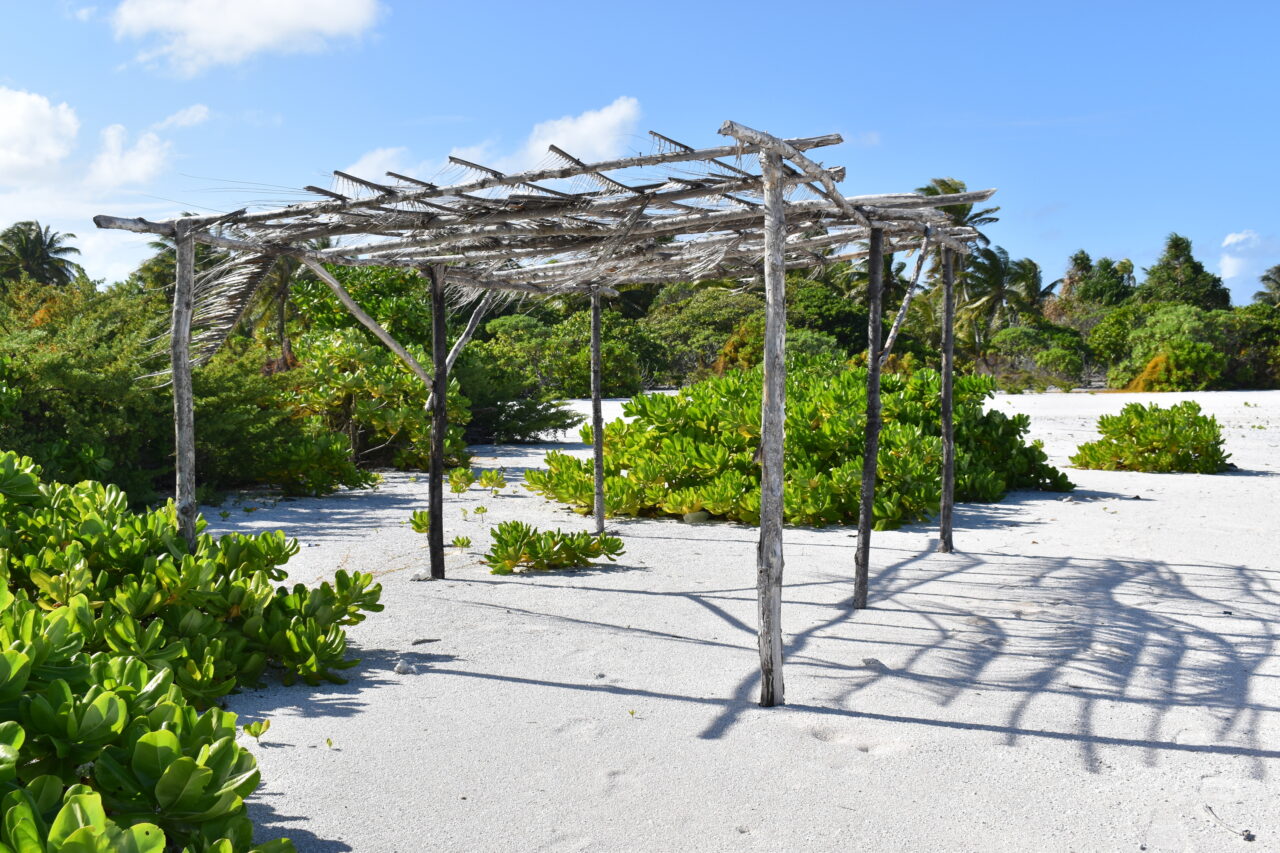Yetta came to understand early in her life that even though her parents and two rough-head brothers loved her dearly, often she would be overlooked. This mattered little in her younger years when Mom and Dad would lift her up and carry her to the seashore to watch the sunset, or off to the store for a popsicle or elsewhere for a bit of an adventure. She loved being held close by Mom or Dad, tucked into their bosom while her brothers had to tag along behind.
But as she got older and her little friends could run off in a moment and not come back, feelings of loneliness and separation would arise, even with the house being full of people. Being only able to sit rather than stand seemed to ensure people just didn’t see her in a room. So slowly she began to withdraw. Trips to the store weren’t so important anymore, and what was the point of friends, if all they ever seemed to do was abandon you just when you wanted their company most?
Just as well old Sister Aneka wasn’t like the rest of her friends. She was different, in all the right ways. And she knew just what question to ask to spark life back into the eyes of a now shy and retiring ten years old girl so unsure of herself. With just a few simple words Sister Aneka would draw out of Yetta’s fertile imagination a long and dramatic tale of fishing on the reef, or sailing through a treacherous storm, or the discovery of a new uninhabited island beyond the horizon. Such tales could go on for hours at times.
As her teenage years embraced her, Yetta clearly understood that she was different from most other folks on the island her age. Confined to a wheelchair, often she felt excluded from discussions, or just once again overlooked and irrelevant. And then when people did make the effort to include her, it was often awkward and excessive, like as if they were doing her a special favour simply by treating her the same way they treated everyone else. Yetta tried hard not to become bitter or resentful, but some days it was just a bit too much and she had to turn away as her tears could no longer stay hidden and ran down her cheeks.
Didn’t anyone care that she had ideas and opinions to share? Didn’t anyone think she could contribute something of value? Didn’t someone, anyone want to know or learn about what she had been doing in all those hours of aloneness while others went fishing or swimming, or walked to the other end of the island?
By her mid-teens, Yetta had determined that such things no longer mattered. Sister Aneka had helped her find and harness what was on the inside and few would be prepared for the day when this would be revealed.
What Yetta had been helped to discover was that though her legs were lazy, her brain was sharp and active. She had a truly amazing mind and could absorb and process masses of information at a lightning pace. So while other youth set off to make mischief with their friends, Sister Aneka would help Jetta wheel her way back to school to spend hours in the library and on the internet. Sure, at times she checked out the latest happenings on Facebook and TikTok, but what really grabbed her attention was information about how the world’s climate was changing, and how some nations were now seeing their shoreline disappearing and crops no longer growing, and facing challenges they had never encountered before. Yetta knew a lot about taking on challenges, so she dug further to soon learn that this climate change was impacting many countries across the Pacific. Tuvalu, Kiribati, Niue and others were all starting to experience the impact of rising sea levels and were concerned for what the future would hold.
“At last!”, Yetta thought to herself. Things were now making a lot more sense. It wasn’t her childhood recollections that were wrong after all. She was certain that in the past the sea was further away from her house than it now seemed – and now she knew that was true. Tide levels had changed over the years and several metres of the beach were now “missing”, swallowed by a hungry sea. And that also helped explained why now there were more days spent locked down at home, unable to get her daily exercise because it was too unsafe for her to journey out into streets more suited to a canoe than a wheelchair. This was especially so during high tide when waves would run well inland and toy with the trees, the houses, and the resting places of ancestors as if encouraging them all to let go and become one with the restless white-crested waves.
This adventure of discovery on the internet quickly led Yetta to the plight of her own remote island home which now sat precariously in a vast, relentless ocean. Her immediate sense of despair for the future was quickly replaced with a sense of knowing that she had to do something, but she knew not what.
As she lay on her bed pondering the future that night, Yetta spent hours texting almost everyone she knew and encouraging them to think about what they together might do – after all, this small island was the only home they’d known and maybe it would not be here in 50 years. By then some of her friends would be national leaders with a serious problem on their hands, so now was the time to start taking action. But still, deep inside, Yetta wondered if anyone would want to listen to an invisible girl in a wheelchair.
As circumstances would dictate, Yetta would find the answer to that question much sooner than she imagined. Unbeknown to her, a team of technical specialists was soon to arrive on Ebeye for a further round of consultations with the community to consider what actions were in plan to help address the very issues of concern to Yetta. She would soon learn that a major project funded by donors had been initiated for the benefit of the Marshall Islands some years earlier, with Ebeye ear-marked for the construction of a protective seawall.
Clamouring off the boat from Kwajalein, the arriving project team was looking forward to again connecting with the local community, keen to ensure their knowledge, concerns and expectations were adequately understood and included in the process of determining how best to finalise the design for the seawall construction.
It was while taking a walk during a lunch break that the bright reflection of sunlight off the rims of Yetta’s wheelchair caught Jake’s attention. She chuckled as she watched him squint and quickly shade his eyes, and then felt nervous as he walked towards her, camera in hand. Immediately Jake introduced himself as one of the visiting project team and asked if she had a few moments to spare. “On Ebeye, we always have a moment to spare”, she thought to herself!
Soon in discussion, Jake seemed genuinely interested to understand what life was like for Yetta on Ebeye, and what she thought about the future, especially the impact of climate change and how it might affect her island. Even Yetta was amazed at what she said and how she spoke with such authority and confidence to Jake. She emphasised that something must be done immediately to stop the worst impacts of seawater flooding over parts of the island as huge waves whipped up by storms crashed ashore. She also pressed home the need for solid protection from rising sea levels, not just for now, but well into the future.
Jake assured her that the project he was part of was tasked with exactly that mission, and the proposed seawall was the best option presently available. When complete it would be a welcome barrier offering protection and safety to the community for years to come. Yetta was so encouraged by what she heard as her mind raced with excitement. She then started to pump Jake with questions, about what was the government doing about adaptation across the whole of the Marshall Islands, and how could she get more involved. What were they doing to help the many other disabled people, the blind, the deaf and the aged and infirmed who also would have to adapt to climate change impact? Yetta of course had many suggestions to make, and it went on like this for over two hours.
As their time together drew to a close, Jake was in awe of Yetta and the knowledge she shared. He had so much information to process and follow up and imagined how impressed the team would be with his efforts. As he stood to leave, a very flustered team leader appeared, pointedly suggesting that Jake had missed the most significant consultation session of the day. Jake smile and simply responded with a “No, Marianna. Rather, I think you guys have just missed the single most important session we’re going to have this entire trip!”
Yetta could not believe what she just heard. Seriously? The invisible girl in a wheelchair now had a voice, one that was heard? She couldn’t wait to share the news with Sister Aneka. As he turned to say his final goodbye, Jake asked if Yetta had one final comment to make. She looked at Marianna and Jake, and said “Just make sure those engineers of yours build this seawall so folks like me have access to still see the sunrise on the horizon from our wheelchairs.” Marianna winked and said “Done!”


